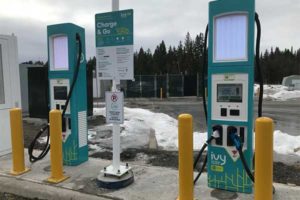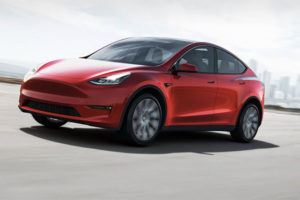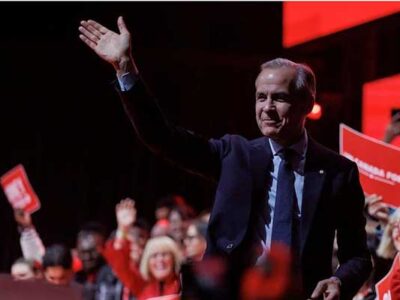In a substantial re-election pivot, Ontario’s Progressive Conservatives are backing electric vehicle (EV) infrastructure throughout the province’s ONroute rest stops. Most of these locations, particularly those found alongside Highways 400 and 401, will have pay-per-use charging stations installed this year.
“All 69 of the province’s ONRoute stations will receive at least two fast-charging stations,” said Todd Smith’s office at the Ministry of Energy in an email to pvbuzz. The recent launch of six charging stations in Cambridge South, Cambridge North, West Lorne, Dutton, Odessa and Napanee “are just the first batch of chargers going live, with more rolling out throughout the summer.”
ONroute locations in Newcastle, Ingersoll, and Maple are being renovated and will see their installations delayed by a couple of years.

The province of Ontario has announced the first six fast-charging EV locations. (Global News)
Hydro One and Ontario Power Generation’s joint network, Ivy, will install the charging stations but it won’t involve direct provincial funding. Natural Resources Canada, however, offered up a $3.45 million loan – accounting for 30% of the project’s total cost.
“We’re making it easier for people in Ontario and across Canada to drive electric,” Natural Resources Minister Jonathan Wilkinson said. “This is a critical part of lowering emissions in the transportation sector and achieving our climate targets.”
This announcement represents a marked shift for the Progressive Conservatives, who began their tenure by cancelling Ontario’s cap and trade system – a form of carbon pricing – and the EV rebates it funded. The ideologically-driven removal of already-installed chargers was even more egregious and attracted a significant backlash. And during the 2018 election campaign, Doug Ford decried EV incentives as subsidization for the rich.
Drivers often spend $100+ to fill up their gas tanks, charging an EV typically costs from $2 to $5 at home and approximately $12 to $14 at a level three public quick charge. Yet, the upfront cost of going electric remains out of reach for far too many Ontarians, which direct subsidies help with.
“Before the election, I didn’t believe in giving millionaires rebates on over $100,000 Tesla cars,” he said Mr. Ford. “I just didn’t believe in it. Let’s see how the market dictates.”
Following the removal of the subsidies, Ontario’s EV market collapsed.

The Model 3 is a desirable and relatively affordable all-electric car that has helped the Tesla brand push EVs into the mainstream. (CarAndDriver)
EVs represented around 3% of passenger vehicle sales in Ontario. This fell to less than 1% following the Progressive Conservative’s changes but has since recovered to its former level with the introduction of a federal rebate. But the EV adoption rate in Ontario remains far lower than in provinces with their own incentives – such as British Columbia and Quebec.
The Ford government’s “Driving Prosperity” plan seeks to make Ontario a juggernaut in EV and battery manufacturing by utilizing minerals found in the undeveloped northern Ring of Fire.
Many, however, have called out the disingenuous nature of the Progressive Conservatives supporting the supply, but not the demand side of the electric vehicle equation – especially as they emphasize “everyday affordability” as a core re-election plank.
“Producing more EVs in Ontario will not directly translate into more EV sales in Ontario unless there’s more support for consumers to go electric,” said Joanna Kyriazis, senior policy adviser at Clean Energy Canada in a statement to CTV news.
President and CEO of Electric Mobility Canada, Daniel Breton, felt that it was contradictory for Ontario to fail to address consumer incentives. “If Ontario wants to be a leader, it’s not a buffet where you pick and choose what you decide to do,” he said.
Strategists at the consulting firm StrategyCorp suggest that the Progressive Conservative’s EV pitch is aimed at locking down manufacturing voters in Windsor and Oakville.
Where the Liberal, NDP, and Green Parties view the issue of EVs primarily through an environmental, climate, and consumers lens, the Progressive Conservatives maintain a strict economic development agenda. Ironically though, this narrow frame of thinking actively undermines the EV market they claim to be champions of.
The Ontario Liberals are promising to implement an EV rebate of up to $8,000 for vehicles under $55,000. The Green Party has pledged $10,000 in rebates, and the New Democrats have promised unspecified amounts for non-luxury EVs.











Comments